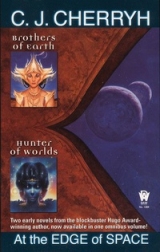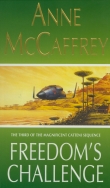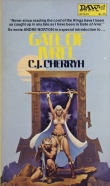
Текст книги "At the Edge of Space (Brothers of Worlds; Hunter of Worlds)"
Автор книги: C. J. Cherryh
Жанр:
Космическая фантастика
сообщить о нарушении
Текущая страница: 23 (всего у книги 36 страниц)
“And is iduve pride that vulnerable, then?”
“Stop challenging me!”
It was a cry of anguish. Chimele herself looked terrified, reminding him for all the world of an essentially friendly animal being provoked beyond endurance, a creature teased to the point of madness by some child it loved, shivering with taut nerves and repressed instincts. She could not help it, as an animal could not resist a move from its prey.
Vaikka.
He grasped it then—a game that was indeed for iduve only, a name that shielded a most terrifying instinct, one that the iduve themselves must fear, for it tore apart all their careful rationality. The compulsion must indeed be involved in their matings—intricate, unkalliran instinct. It was reasonable that the noi kame feared above all the iduve’s affections, feared closeness. A kallia quite literally did not have a nervous system attuned to that kind of contest. A kallia would want to play the game part of the way and then quit before someone was hurt; but there was a point past which the iduve could not quit.
“It is possible,” he said carefully, “that I did not use good judgment.”
She grew perceptibly calmer at that slight retreat, slowed her breathing, patted his arm with the thoughtless affection one might show a pet, and then drew back her hand as if mindful of his inward shudder. “Surely then,” she said, “understanding your nature and ours, you need not stand so straight or stare so insolently when that irrepressible tongue of yours brings you afoul of our tempers.”
“I was not educated as kameth.”
“I perceive your difficulty. But do not seek to live by our law. You cannot. And it is not reasonable for you to expect us to bear all the burden of self-restraint. I thrust you into close contact with us, a contact most kameth-born scarcely know. It cannot be remedied. I trusted your common sense and forgot kalliran—I know not whether to say obstinacy or elethia,an admirable trait—but that and our aggressiveness, our m’melakhia,is a very volatile combination.”
“I begin to see that.”
“Go back to your quarters this night, for your safety’s sake. I will respect your m’melakhia,your—protection—of your human asuthe as much as I can, and I will not remember this conversation to your hurt. You are wiser than you were. I advise you to make it apparent to my nasithi-katasakkethat vaikkahas been settled.”
“How?”
“By your amended attitude and increased discretion in our presence.”
“I understand,” he said, hesitated awkwardly until an impatient gesture made clear his dismissal. Almost he delayed to thank her, but looking again into her eyes chilled the impulse into silence: he bowed, turned, felt her eyes on his back the whole long distance to the door.
The safety of the hall, the sealing of the door behind him, brought a physical relief. He lowered his eyes and flinched past an iduve who was passing, secured the lift alone, and was glad to find the kamethi level, where kallia thronged the concourse—the alternate day-cycle, whose waking was his night.
He knew the iduve finally.
Predators.
Outsiders had never understood the end of the Domination, the Sundering of the iduve empire. He began to.
They were hunters from their very origins—a species for whom all else that moved was prey, for whom others of their own kind were intolerable. They had hunted the metrosito exhaustion and drifted elsewhere. Now they were back. The enormity of the surmise grew in him like a sickly chill.
The nasul—jealously controlling its territory.
Perhaps even the iduve themselves had forgotten what they were; the pride of ritual and ceremony shielded their instincts, civilized them, as civilization had dealt with the instincts of kallia, who had been the natural prey of other hunters in packs, on the plains of prehistoric Aus Qao. Subtle reactions, a tensing of muscles, an interchange of movements, the steadiness of the eyes—these defined hunter and hunted. That was the thing he had looked in the face when he had stared into Chimele’s at close range. He had wished to run and had instinctively known better—that if he stayed very, very still, it might pad softly away.
He shivered, the hair rising at the nape of his neck as if she still watched him. When he felt Isande’s frightened presence beginning to creep back into his mind, he screened heavily, for he still was shaken, and he was ashamed for her to know the extent of it.
You nearly killed yourself,she accused him. I warned you, I warned you—
“Not well enough,” he returned. “You have a blind spot. Or you do not understand them.”
“I have lived my whole life among them,” she retorted, “and I have never seen what you saw tonight—not even from Khasif.”
He accepted that for truth. Likely kamethi had been taught never to draw such responses. But he was world-born; he himself had sat by fires at night in the wilds of Lelle, with a ring of light to guard his sleep, and he knew Chimele in all the atavistic fears of his species.
A predator who had assumed civilization.
Who had touched him gently and refrained, despite his best attempt to provoke her– ignorant,she had called him, and justly.
“Chimele is iduve,” Isande hurled against the warmth of that thought, forcefully, for she hated worse than anything to have her advice ignored. “And you will live longer if you remember that we are only kamethi, and avoid provoking her and avoid attracting her notice to yourself.”
This from Isande, Isande who loved Chimele, who willingly served the iduve: who trembled in her heart each time she dealt with Chimele’s temper. It was a sorrowful life she had accepted: he let that slip and was sorry, for Isande flared, hot and unshielded.
Am I nothing,she fired at him, because I was born kameth? My world-born friend, I have been places you have not dreamed of, and seen things you cannot understand. And as it regards the iduve, my friend, I have lived among them, and what of their language you know, you lifted from my mind, what of their customs you understand you have learned from me, and what consideration you had from Chimele you have because of me, so do not lecture me as an expert on the iduve. If you were not soikas, you would not have had so dangerous an experience.
Well,he returned, I hardly seem to have a monopoly on vanity or selfishness or arrogance, do I?
And the resentments that echoed back and forth, too much truth, sent both personalities reeling apart, hurt.
Isande was first to touch again, grieving. “Aiela,” she pleaded, “Asuthi must not quarrel. Please, Aiela.”
“I am vain and arrogant,” he admitted, “and I have had almost all the damage my sanity can stand tonight, Isande. I’m tired. Go away.”
Daniel,she remembered, dismay and regret sharp in her; she remembered other things she had gleaned of his mind, and riffled through all the memory he left unscreened, gathering this and that with a rising feeling of distress, of outrage. He felt her, poised to blame him for everything, to accuse him of things the worse because they were just.
And she did not. He was so tired his legs shook under him, and he felt himself very lonely, even in her presence: he had disregarded everything she had meant to protect them both, and now that she had utmost cause to rage against him she pitied him too much to accuse him. She knew his nature and his incapacity, and she pitied him.
Leave me alone,he wished her. And then furiously: Leave me alone, will you?
She fled.
He undressed, washed, went through all the ritual of preparing for bed, and tried to sleep. It was impossible. Reaction still had his muscles in knots. When he closed his eyes he saw the paredre,Chimele—cages.
He arose and walked the floor, tried listening to his old tapes, that he had brought from Kartos. It was worse than the silence. He cut off the sound, idly cut in on the monitor that was preset for Daniel’s next-door apartment. The human was still blissfully unconscious.
And the memory returned, how it had felt to live in that envelope of alien flesh. He broke the connection, dizzied and disoriented, wandered back to the bath, drifting as he had a dozen times, to the full-length mirror. It contained all in Ashanomethat was familiar, that was known.
His image stared back at him, naked of everything but the idoikkhethat circled his wrist like some bizarre barbaric ornament. His silver hair was beginning a slow recovery from the surgeons’ unimaginative barbering, and he had grown accustomed to the change. His features among kallia were considered proper: straight silver brows, a straight nose with a little flare to the nostrils, a mouth wide enough to show generosity, a chin prominent as with all the Lyailleues. He fingered the high prominence of his cheekbone and the hollow beneath, staring into his own eyes closely in the mirror, wondering how much of the iduve eye was iris. Was it all? And could they see color as kallia could? Humans did. He knew that. He considered the rest of himself, 7.8 meisin stature, a little taller than the average, broad-shouldered and slim at the hips, with the slender, wellmuscled limbs of an athlete, the flat belly and muscular girdle of a runner, a hard-trained body that had no particular faults. He had never known serious illness, had suffered no wounds, had never known privation that was not his own choice. He was paromeDeian’s only son; if he had had any faults at birth, no money would have been spared to mend them. If he had lacked any in wit, paromeDeian’s money would have purchased every known aid to teach him and improve his mind. When he grew bored, there had instantly been toys and games and hunts and athletics, and when he became a young man, there had been all the loveliest and most proper girls, the most exclusive parties. There were private instructors, the most proper and demanding schools; and there had been family despair when he insisted on pursuing athletics to the detriment of his studies, on risking his life in hunts, on turning down a career in district politics that was calculated to lead to the highest levels of government—a lack of family and filial giyrethat his father refused to understand (“ Ikas,” Deian had said, “and ungrateful.” “Am I ikas,” he had answered, eighteen and all-knowing, “because it is not my pattern to be like you?” “There have been Lyailleues on the High Council for two hundred years, honoring Xolun and this house. My son will not take it on himself to end that tradition.”)
Once that year he had thought of hurling his plane (a luxury model) in a pyrotechnic finish at Mount Ryi, in full view of all the fashionable estates and the Xolun zone capitol. The news services would be buzzing with wonder for days: Son of Deian, Suicide; and people would be shaking their heads and making small noises of despair and secretly hating him, thinking if only they had had his advantages they would not have thrown them away. When he was nineteen he had quit school so that his father Deian would disinherit him and his mother and sister would give him up; but he also saw it broke their hearts, and his few passages with the pleasures of the metrosi’sdarker side left him disgusted and embarrassed, for these things were also available in the estates in the shadow of Ryi—without the filth and the fear. In the end he had surrendered and returned home to the respectability planned for him, to learn the business of government.
(“Son, it is always necessary to compromise. That’s how things are done.” “Even when one is right, sir?” “Right—right; you always assume you know exactly where that is, don’t you? I’m sure I don’t. If you go on like that, no one could ever agree. Compromise. Sometimes you have to yield a little to win a little later on.”)
He had tried.
A year later he had sought the anonymity of the service, and even that had proved no refuge secure from Deian’s money and influence. Perhaps, he thought, it was his father’s way of setting him free; or perhaps Deian still believed he would have come home, older, wiser. He would have come home, sooner or later. He had spent his life pursuing the elusive hope of adequacy, a constant struggle for breath in the rarified atmosphere of his father’s ambitions and the giyreof his ancient family.
(“I would have come home someday,” he had written in that final letter. “I have gained the good sense to honor your wisdom and experience, Father, and I have gained enough wisdom of my own to have kept on in my own path. What giyreI had of my crew, I earned; and that is important to me. What giyreI gave, I chose to give, and that was important too. I honor you, very much; but I would not have left the service.”)
It was irony. He closed his hand about the idoikkheand reminded himself what he was worth at the end of all his father’s planning and his resisting: a being scantly adequate to serve the iduve, equal to a gracious (if vain) young woman and a battered bit of human freight off an amaut transport. He had lived with the sky overhead to be reached, whether or not he chose to try, and whether or not he had realized it before, he had been an arrogant and a stubborn man. Now he had been shown where the sky stopped, and it was a shattering experience.
He imagined Daniel’s image in the glass. The skin went shades of brown and pink, the silver hair turned dark, the eyes shadowed and hunted, his body slight with hunger, crossed with red and purple scars from untreated wounds, feet lacerated by the cruel mesh. His mind held memories of absolute horror, cages, brutality unimagined in the Halliran Idai.Even before those, there were memories of hunger, a childhood in a dark, cement-walled house beside a trickling canal, summers of sand-storms that blasted crops, dunes that year by year encroached upon fields, advanced upon the house, threatened the life-giving canal. At some time—Aiela had inherited the memories in bits and snatches—Daniel had left that world for the military, and he had served as a technician of limited skills. He had known a great many primitive human ports, until the life sickened him and he went home again, only to find his father dead, his mother remarried, his brothers gone offworld, the farm buried under dunes.
War. Shipping lanes closed, merchantmen commandeered for military service. Daniel—senior now over inexperienced recruits, wearing the crisp blue of a technician on a decent ship, well fed, with money promised to his account. That had lasted seven days, until two stunning defeats had driven the human forces into retreat and then into rout, and men were required by martial law to seek their home ports and keep order there as the panic spread.
That was the way fortune operated for Daniel. His hands had been emptied every time he had them full; but being Daniel, he would shrug perplexedly, get down on his knees and begin picking up the pieces. He was uneducated, but he had a keen intuition, an intelligence that sucked in information like a vacuum drawing air, omnivorously, taking scrap and debris along with the pure, sorting, analyzing. He had never been anyone, he had never had anything; but he was not going to stop living until he was sure there was nothing to be had. That was Daniel—a man who had always been hungry. M’melakhia,Chimele would call it.
And Daniel’s desire was the fevered dream of his half-sensible interludes in the cage, when the fields were green and the canal pure and full and orchards bloomed beside a white-walled house. He asked nothing more nor less than that—except the company of others of his kind. He had never deserved to be appropriated to Ashanome,swallowed whole by the pride of a Lyailleue and linked to a kalliran woman who had never learned to be kallia, who was more than a little iduve.
Aiela,Isande’s thought reproved him, sorrowing.
How long have you been with me?He flushed with anger, for he had been deep in his own concerns and Isande’s skill was such that he did not always perceive her touch. It was not the visual sense that embarrassed him: she knew his body as he knew hers, for that was a part of self-concept. It was his mind’s privacy that he did not like thus exposed, and he knew at once from the backspill that she had caught rather more than she thought he would like.
“Dear Aiela,” her silent voice came echoing. “No, don’t screen me out. I am sorry for quarreling. I know I offend you.”
“I am sorry,” he sent, the merest surface of his thoughts, “for a great many things.”
“You are not sure you can handle me,” she said. “That troubles you. You are not accustomed to that. You are not half so cruel or fierce as I am, I know it; but you are twice as brave—too much so, sometimes, when that terrible pride of yours is touched.”
“I have no pride,” he said. “Not since Kartos.”
She was amused, which stung. “No. No. It is there; but you have had it bruised—” the amusement faded, regretting his offense, and yet she knew herself right by his very reaction: right, and self-confident. “Chimele—the iduve in general—have touched it. You are just now realizing that this is forever, and it frightens you terribly.”
Her words stung, and a feeling wholly ikasrose up in him. “I don’t need to live on your terms. I will not.”
She was silent for a time, sifting matters. “You do not understand Ashanome.Tonight you saw the chanokhiaof Chimele, and I am afraid you have begun to love her. No—no, I know: not in that way. It is something worse. It is m’melakhia-love. It is arastietheyou want from her—iduve honor; and no m’metanecan ever have that.”
“You can’t even think like a kallia, can you?”
“Aiela, Aiela, you are dealing with an iduve. Realize it. You are reacting to her as she is.You are thinking giyre,but Chimele cannot give you what she cannot even understand. For her there is only arastiethe,and the honor of an iduve demands too much of us. It costs too much, Aiela.”
“She might be capable of understanding. Isande, she tried—”
“Avoid her!”
Screens dropped. Loneliness, a dead asuthe, years of silence. There was still loneliness, an asuthe who rejected her advice, who blindly, obstinately sought what had killed the other. Was the fault in her? Was it she that killed? She loved Chimele, and gave and gave, and the iduve knew only how to take. Reha had loved Chimele: asuthe to herself, how could he have helped it? He would be alive now, but that he had learned to love Chimele. She would not teach another.
Darkness. Cold. Screens tumbled. Aiela flinched and she snatched the memory away, recovering herself, smothering it as she had learned to do.
You denied,he reminded her gently, ThatAshanome killed him. Was Chimele responsible, after all?
The screens stayed in place. Only the words came through, carefully controlled. “She was not responsible. Honor is all she can give. To the nasithi,that is everything. But what is it worth to a m’metane?”
Yet you do love her,Aiela sent, and sad laughter bubbled back.
“Listen—she tried with all her iduvish heart to make me happy. Three times she asked me to take another asuthe. ‘He is like you,’ she said this time. ‘He is intelligent, he is of great chanokhiafor a m’metane.Can you work with this one?’ I consented. She risked a great deal to offer me that choice. You would have to know the iduve to realize how difficult that was for her—to try a thing when she has only reason to help her. She does feel—something. I am not sure what. After all these years, I am not sure what. Maybe we m’metaneitry to read into them what we wish were there. Perhaps that is why we keep giving, when we know better.”
“Let me alone,” he wished her. “If I’m to make a mistake, then let it be my mistake.”
“And when you make it,” she said, “we will both pay for it. That is the way this arrangement works, Aiela.”
It was truth; he recognized it—resented her being female. It was an unfair obligation. “I am sorry,” he said after a moment. “Then it will happen. I will not be held by you.”
“I disturb you.”
“In several senses.”
She snatched a thought half-born from his mind, the suspicion that the iduve knew enough of kalliran emotion to use it, to manipulate it at will. Isande was beautiful: he had eyes to notice that. He kept noticing it, again and again. That she constantly knew it, embarrassed him; he knew that she was not willing to think of him in that way. But, he sent her, if she were in the un-graceful position of having to share a man’s inmost thoughts, she might receive things even more direct from time to time. Or had Reha been immune to such things?
The screen closed tightly on those memories, as it always had: the privacy she had shared with Reha was not for him. “He and I began so young we were like one mind; there could never be that between us. Asuthi ought never to share that part of their lives: some illusions have to be maintained. I am not for games, not for your amusement, nor are you for mine, dear friend. There is an end of it. You came too close to that being, you refuse my warnings about the iduve, and I see I can’t help you: you resent being advised by a woman. But I can at least exercise the good sense to keep my distance from you when it happens.”
Hurt feelings. Bitterly hurt feelings.
“Don’t,” he said, reaching out to her retreating mind. And when she lingered, questioning, he searched for something to say. “If you’re not going to sleep, stay awhile. It’s miserably quiet here.”
Softness touched his mind. He had pleased her by asking. Her spirits brightened and amusement rippled from her, to think that he found in her the power to deal with the nightmares that troubled him: human ghosts and iduve went flitting into retreat at her kalliran presence.
“Go to bed,” she told him. “You need your rest. I’ll stay awhile if it pleases you.”
She hovered about his thoughts for a long time thereafter, half-asleep herself at the last and warm in her own bed, lending him the comforting trivia of pleasant memories, the distant voyagings of Ashanome,strange worlds and different suns; and she stole from his memories, filching little details of his past and embroidering them with questions until he grew too tired to answer. She, never having walked upon the face of a world, delighted in the memories of wind and rain and sunsets, the scent of green grass after a shower, and the drifting wonder of snow. There were no ill dreams. She held onto his senses and finally, mischievously, she sent him a few drowsy impressions that were less than sisterly.
He fired back indignation. “Games,” he reminded her.
Vaikka,she whispered into his consciousness. And you do not want to tell me to go away, do you?
He did not, but he screened, and headed himself deliberately toward the darkness of sleep.








